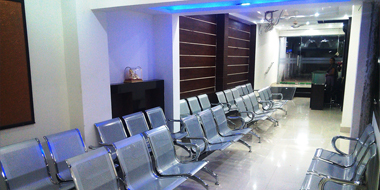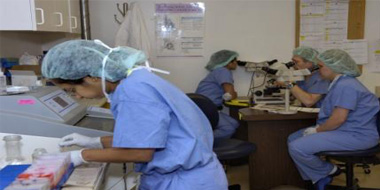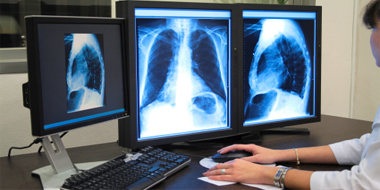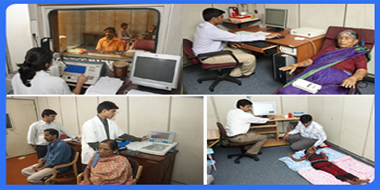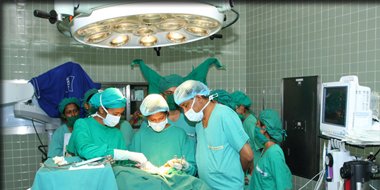Recurrent bleeding, sliding down of the anal parts, painful and hard stools are some of the common problems faced by patients suffering from piles. A change in dietary habits as also the remedies provided by various fields of medicine provides only a temporary relief. Conventional therapies like injection of piles, banding, etc., also fail to provide a permanent cure. Pain associated with such procedures and in the week to follow, not to mention the loss of working hours, make these options unfavourable to the patient. With so many quacks boasting of a complete cure and with all the misconceptions about this disease, a person suffering from piles is left in a state of utter confusion !
To begin with, let us understand where the problem lies. Piles basically, is the swelling of blood vessels near the anal opening and a sliding down of the lining of the anal canal. It usually starts with itching in the area and a feeling of heaviness. Later, bleeding from the anal opening and pain during or after defecation make their appearance. The question that now arises is who is likely to get this hidden disease which makes every morning unwelcome ? The most common cause is constipation which requires straining during defecation. This leads to pressure on the blood vessels in this area causing them to swell, elongate and slide down through the anal opening. When hardened stools come in contact with these swollen vessels, the friction between the two causes the vessels to rupture and bleeding ensues. It is at this stage of the disease when the patient begins to panic. Increased abdominal pressure during pregnancy also has a similar effect which is the reason why this problem is common during these times. All said and done, how does one prevent or stop piles at an early stage ? A fibre rich diet which includes sprouts, green vegetables, fruits and intake of sufficient amount of water keeps the stools soft, prevents constipation and the resultant straining
during defecation.
As the disease advances, a systematic clinical examination and diagnosis from a specialised doctor is of utmost importance. Treatment options include medicines, conventional surgeries and the latest innovative Stapler surgery (Minimally Invasive Procedure for Haemorrhoids - MIPH). Medicines for piles provide only a temporary relief, while Injection of Sclerosants and banding are useful in the very early stages of the disease only.
In conventional operations, the patient has to face problems like blood loss, pain and narrowing of the anal opening. Besides, these procedures do not guarantee a complete removal of the piles mass.
After years of surgical research, the 21st century saw the invention of stapler surgery (MIPH), which 0 ensures a complete removal of piles from its roots in a circumferential 360o pattern. This surgery certainly has an edge over its counterparts because of the mimimal blood loss and negligible pain. The patient has to undergo just 24 hour hospitalisation and can return to work in 3 days. This technique also carries the advantage of a shorter operating time and the least chance of recurrence.
Thus, with expanding horizons in the surgical field and rise of stapler surgery, patients of piles can heave a sigh of relief !
Also, with the invention of STARR Surgery, patients suffering from constipation can now hope for permanent cure.
Is Chronic Constipation Controlling Your Life?
Now there's a procedure that could brighten your future: STARR
Is Chronic Constipation ControlIing Your Iife? You aren't alone
Constipation is one of those topics few people like to discuss. But if you suffer
from constipation you know it can be painful and frustrating and interferes greatly
with your daily life.
Almost everyone suffers from constipation at some time. Studies show that up to
16 percent of women in the India meet symptom criteria for chronic constipation.
Moreover, people tend to suffer with the condition for a long time. Research
shows up to 45 percent of individuals with constipation report having the
condition for five years or more.
Now there is a good reason to talk about chronic constipation. There is a surgical
alternative that may be able to help women who have been unable to find
solutions in the past for a type of chronic constipation called Obstructed
Defecation Syndrome (ODS).
Before you can understand whether you may have ODS, you need to understand
more about chronic constipation.
What is Constipation?
Constipation occurs when bowel movements become diffcult or less frequent. Constipation is not a disease, but a symptom
related to a family of diseases generally classifed as 'defecation disorders'.
How do you know if you suffer from Chronic Constipation?
Often people don't realize they are constipated. In one study, 37 percent of women who met symptom criteria for
constipation did not regard themselves as constipated.
The following self-assessment can help you determine whether or not you may suffer from chronic constipation. Check all
the boxes that apply :
Fewer than three bowel movements per week
The need to strain at least 25 percent of the time during bowel movements
A feeling of not being able to complete your bowel movement at least 25 percent of the time
Hard or lumpy stools at least 25 percent of the time
If you checked at least two of the above boxes and have experienced those symptoms for at least three months, you may
have chronic constipation.
How is chronic constipation treated?
Most of the time, chronic constipation can be relieved using a combination of diet, exercise and medication.
If these approaches do not relieve your chronic constipation, you should discuss treatment options with a physician. You
may be suffering from a type of chronic constipation known as Obstructed Defecation Syndrome (ODS).
What is ODS?
ODS is a form of chronic constipation that affects thousands of people in the India – primarily women. In many cases, it is part
of a more generalized weakness of pelvic support structures. Women with ODS commonly plan their daily activities around
their bowel habits.
What are the Symptoms of ODS?
If you have chronic constipation and also have one or more of the following symptoms at least 25 percent of the time during
bowel movements, you may have ODS :
Multiple trips to the bathroom
Prolonged straining
Incomplete elimination, and/or prolonged time to have a bowel movement
Routine use of laxatives or enemas
The need to press around your genitals or anus to have a bowel movement
What is STARR ?
STARR is a surgical procedure that is performed through the anus, requires no external incisions and leaves no visible scars.
Using a surgical stapler, the procedure removes excess tissue in the rectum and reduces the deformities that can cause
ODS. Patients undergoing STARR are typically hospitalized for one to three days and have minimal recovery time after
leaving the hospital.
Is STARR Effective?
Yes. In a recent clinical study, chronic constipation symptoms signifcantly improved in most patients undergoing the STARR
procedure. Overall patient satisfaction with the STARR procedure was high, with 90 percent of patients rating the results as
either good or excellent.
